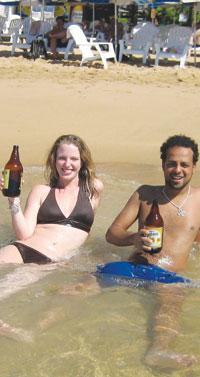UMass Boston Students Enjoy Winter Break Learning Spanish South of the Border

B. Sourial)
Bishoi and Megan enjoying the sun, waves, and drinks in Acapulo (Photo
February 5, 2007
While most UMass Boston students spent their winter in the frigid chill of the northeast, a select group of students from various backgrounds took advantage of the International Programs offered by the Division of Continuing, Corporate and Distance Education and spent their winter in the temperate sunshine of Cuernavaca, Mexico.
During the month-long program, students could earn either three or six credits through intense study of Spanish or political science. Spanish students were offered courses at any level, and for several, this was their first exposure to the language while others had much experience and were using their time to practice and polish their speaking abilities. The political science courses were geared toward the political history of Mexico, as well as Mexico’s current political system.
Many students were very happy with the ability to spend time with others, as students taking classes in the regular semester rarely make friends or engage in social activities with other students on campus.
“It was a great experience for me because it granted me the opportunity to bond with other UMass Boston students,” class of 2009 student Michelle Tracchia said. “It’s just unfortunate I had to pay three grand for it to happen.”
While classes consumed the bulk of the students’ time, there was an opportunity for play. Students were able to take trips to various historical sites such as the Aztec pyramids at Teotihuacan and Cortez’s Palace. Students also had time to enjoy the sun and waves in Acapulco and party over New Year’s in the megalopolis of Mexico City.
Some students felt that the amount of relaxation and partying far outweighed the time spent studying. Students visited local bars and clubs on a nearly nightly basis. Soon after arriving, a Facebook group titled “I got drunk in Mexico and got credit for it…bitches” was credited. Several participants in the program are members of the group and many have posted or tagged photos which show them partaking in various states of revelry. No pictures of students studying or practicing Spanish were found at the time of publication.
A prevailing sentiment among students was that the classes moved too quickly, or were too difficult. One month is an extremely short period of time to take a course, and internalizing information as complex as another language is nearly an impossibility in such a short time frame. Many students who were expecting to earn six credits only came back to the United States with three. Students noted that to earn three credits they were still required over 100 hours of class work time, far greater than that required in a typical class. Students felt they were unfairly given little credit for a lot of work.
No matter the amount of credits earned the price remained at a constant $2,150. The amount of work required was also equal for both six and three credits also remained at a constant five hours of class a day. Some students felt that those who came on the trip with previous Spanish experience were given advantages over those who came in to learn Spanish as beginners.
The cost of the trip included tuition for the local teachers, meals for the month, and a place to stay. Had students taken the trip on their own, and not through UMass Boston the price would have been approximately $1,360. The remaining $790 went directly to the University. Students were required to purchase their own airline tickets.
Many students complained about the disorganization in the UMass Boston offices. Students were not informed of their acceptance into the program until shortly before the break, which resulted in high airline ticket prices for the students that attended. The number of credits and placement into classes was also a stressful and confusing ordeal. Payment also caused confusion as students were given a one-day notice before payment was due, but then the money was not deducted from their accounts for several weeks.
CCDE also offers international programs to Belize, Ireland, Jamaica, Puerto Rico, China and Amsterdam. The programs require applications, which include meeting GPA requirements, an essay and a teacher recommendation.










































































